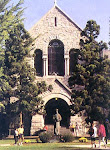Dear colleagues,
On Wednesday at noon, the TLI sponsored its first panel, on the ever-popular question of generating student discussion. Our panelists were Stephanie Mackler (Education), Becky Jaroff (English), and April Kontostathis (Education). Thanks to many of you for spending your lunch hour with us! Below, some of the highlights:
Stephanie began by exploring the big questions: why would we ever think discussion is worth having? What would it mean to say "discussion is a way of teaching"?
Here were some potential answers:
*Discussion shifts from disseminating information to developing powers of reasoning, to democratic deliberation. Discussion helps students gain the ability to talk through ideas.
*Discussion helps students practice speaking the language of the disciplines.
*Discussion shifts the discourse for students--it helps them tolerate ambiguity, see that there are differences in perspective, makes clear that for many questions, there are no right answers.
After this introduction, Becky offered some ways to prepare students for discussion. As she noted, students (especially on the lower level) often do not realize that they are responsible for their own learning. Generating knowledge is a communal practice, and we all share responsibility. To help students get started, she recommends:
*study questions--homework; get students writing and thinking before they enter your classroom
*have students bring things in to make the material relevant for themselves (objects from their own lives relevant to your course material)
*give students their day--debates and in-class projects where we be quiet and let the students organize the discussion
*push a little bit (do not be afraid to challenge students--to call on them if a class is silent, to question silences without being humiliating)
*make students grade participation; everyone evaluates the participation habits of others twice over the course of the semester (it was noted that this takes the pressure off professors, allowing for a more productive use of faculty time
April then followed up by explaining how and why she brings discussion into the science classroom.
*as others have mentioned, it shifts pressure from dissemination of information
*connects science to real world issues, making clear to students how the technology they study is used in society.
April mentioned some projects that sounded fascinating to this nonscientist: putting popular science articles on the syllabus, making students experts on these topics in advance, emphasizing creativity (how could you write a compiler, for example?).
In the large group, we discussed some of the challenges of discussion, and everyone had their own ways of dealing with them. The first--what do you do with students who dominate discussion? There were many responses, which included:
*flatter students on their oral skills, ask them to let others speak first
*limit students to a certain number of contributions per class
*ok to ignore someone constantly raising his or her hand
*use a roulette wheel that he spins to choose the next participant (so it really is by chance!)
*both Becky and Stephanie play a game called "popcorn," in which the first participant who answers a question gets to call on the person of his or her choice
The next big question--what do you do when discussions go bad? how do you salvage a failed discussion? This is perhaps the lingering question for many of us--cultivating discussion is linked to larger questions of student engagement. As Lew put it, "What is the magic? When does it happen? How do you cultivate a culture where it is ok not to be bored?" These are big questions, speaking to general problems of generating enthusiasm for students emerging from the K-12 system. We discussed a variety of approaches: "being the magic," as Erec put it--letting our own enthusiasm bubble over the students; exercises that allow students to take a stand through adopting a role; and the barometer exercise, in which students have to move around the class to physically inhabit a position they have taken. Our discussion Wednesday began by considering the value of discussion writ large, and ended with a burst of spontaneous enthusiasm, as faculty around the room offered their methods of getting students excited. Perhaps "Generating discussion" and generating enthusiasm can be mutually constitutive, one leading to the other and back again.
Subscribe to:
Post Comments (Atom)

No comments:
Post a Comment